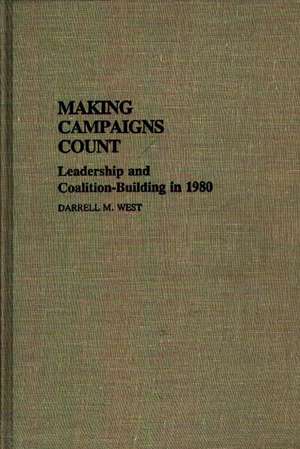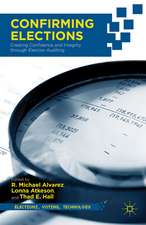Making Campaigns Count: Leadership and Coalition-Building in 1980: Bibliographies and Indexes in Women's Studies, cartea 110
Autor Darrell M. Westen Limba Engleză Hardback – 30 apr 1984
Darrell M. West explores leadership and and coalition-building in the 1980 presidential campaign. Concentrating upon the candidates' own perceptions of the need to build coalitions that will elect them, he raises questions that go to the heart of presidential politics: how have changes in presidential campaigns influenced candidate strategies? what coalitions did presidential contenders try to put together? how did the candidates use rhetoric, campaign travel, and symbolism in their coalition building? what did candidates learn from their audiences in their months and years on the campaign trail? what do these lessons imply for political leadership and coalition building? To answer these questions, he draws on interviews with ninety advisors to candidates and on data taken from the candidates' travels and speeches, press coverage, and audience reactions. His findings reveal a surprising consistency in the approach to building an electoral majority.
Preț: 346.25 lei
Preț vechi: 556.59 lei
-38% Nou
66.25€ • 69.17$ • 54.83£
Carte tipărită la comandă
Livrare economică 05-19 aprilie
Specificații
ISBN-10: 0313242356
Pagini: 198
Dimensiuni: 156 x 234 x 13 mm
Greutate: 0.48 kg
Editura: Praeger
Seria Bibliographies and Indexes in Women's Studies


























